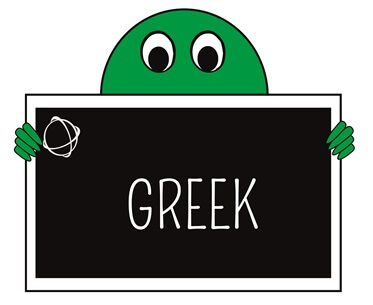Atlas Translations: Translation into Greek
Translation into Greek
I can tell you now…. before you read this to the end that this may not be the most informative blog about language. Sorry, I can’t resist, as it’s all Greek to me. Well, we were all thinking it weren’t we?
For the facts ‘n’ figures, I will of course conduct some research and divulge later on in this ‘ere blog. But first, I have a teeny-tiny confession to make.
All Greek to me?
I have been at Atlas Translations for 2 years and I am ashamed to say I only speak one language – and even my grasp on this, the English language is debatable. Thankfully we have (literally thousands) of professionals who can fill in the language gaps for me. Typically British of me isn’t it? Sorry about that – let me make a cup of tea and chat about the weather instead. The fact I am monolingual (singlelingual?), won’t stop me doing my best. Back in the days before smartphones, language apps and google-translate, when I was abroad on holiday, my friends and I would rely on the trusted phrase-book to get us by in asking for directions, polite pleasantries and ordering in restaurants etc. We would do this in some pathetic attempt to compensate for our low-level language achievements in the British education system. For me, all I remember is window-shopping in German – stadtbummel, since you ask. And ‘I like strawberry ice-cream’ in French – particularly annoying as I don’t actually like the stuff (I am partial to a spot of stadtbummeling though). After a lovely meal at a Taverna on the Island of Cos, my friend asked me to check the phrase-book for the Greek equivalent of ‘compliments to the chef’. I flicked through my phrase book and opted instead, for a random phrase. Purely for my own amusement. I offered with equal parts confidence, delight and unsolicited mischief, “Zesto Nero” – I even added some European-style flamboyant arm gestures to provide authentic gusto. Needless to say, the confused exchange between my friend and the waiter had me unable to speak and barely able to breathe for laughing. It still makes me chuckle and yes, I am sniggering now – 16 years later! “Zesto Nero!” [nodding, waving arms towards mouth, kissing gesture with poised fingers at mouth etc].

The Facts & Figures Bit
The first form of the Greek language to be used was in the 3rd millennium BC. And in the 8th century BC, the Greek poet Homer wrote The Odyssey and The Iliad – two epic poems. And when I say epic, I use that word in its original form. Not the more modern definition of epic (amazing, brilliant etc) although I don’t doubt that it was ground-breaking and ‘well sick’ and all that. I just can’t remark on the works of Homer as I haven’t read the poems. This is despite the fact that there are more than 70 translated versions of The Iliad. Around the 1400’s, Ancient Greek began to give way to what we today refer to as, Modern Greek. That said, the 2 ‘Greeks’ are similar enough for a native speaker today being able to read and understand Ancient Greek.
The Greek alphabet has been ‘in operation’ since the late 9th or early 8th century BC. The word ‘alphabet’ is actually the first two letters of the Greek alphabet (alpha beta). Don’t think about that for too long or you will fall down an alphabet worm-hole.
The longest word in the Greek language is a fictional dish and, I think, it lists all its ingredients. Here we go:
λοπαδοτεμαχοσελαχογαλεοκρανιολειψανοδριμυποτρ
ιμματοσιλφιολιπαρομελιτοκατακεχυμενοκιχλεπικοσσ
υφοφαττοπεριστεραλεκτρυονοπτοπιφαλλιδοκιγκλοπε
λειολαγῳοσιραιοβαφητραγανοπτερυγών
If, like me, you’re having some difficulty reading this in Greek, let me help you with a simplified, phonetic version – here is it in English:
Lopadotemachoselachogaleokranioleipsanodrimh
ypotrimmatosilphioparaomelitokatakechymenok
ichlepikossyphophattoperisteralektryonoptekeph
alliokigklopeleiolagoiosiraiobaphetraganopterygon
If you are still struggling with this and you were hoping to order it in a restaurant, you might want to opt for something simpler. I recommend Zesto Nero. Besides which, the longest word refers to a fictional dish so to order that, you run the risk of looking stupid.
Arguably, Greek is the first great language of Western Civilisation. “Its lucidity of structure and concept, together with its seemingly infinite variety of modes of expression, render it equally suitable to the needs of the rigorous thinker and the inspired poet.”(Kenneth Katzner 1977).
Here are a few of those rigorous thinkers and inspired poets… in no particular order:-
Socrates the founder of Western Philosophy, Aristotle another celebrated philosopher and scientist (and teacher to Alexander the Great);
Poets such as Homer and Aesop;
Mathematicians such as Pythagoras and Archimedes;
‘The father of Western Medicine’ Hippocrates who created the first oath physicians should follow. The Hippocratic Oath is still taken today by doctors, to uphold specific ethical standards and do no harm.
Greek is everywhere. You may not even know it’s there, but it all around. It has influenced us in a myriad of ways. Even the word ‘myriad’ came from Greek. So much of mathematics is with thanks to Greek and formulae named after the Greek mathematicians. Have you ever taken a photo with your smartphone? The word photo comes from the Greek word ‘light’. The word Greek word ‘phone’ means sound. Other English prefixes originate from Greek :-poly- (many/much); micro- (small) auto- (self); psycho- (mind); tele- (distance).
For someone who loves languages, yet is limited to only knowing the one, I am proud that I speak a lot of Greek, albeit inadvertently. 30% of the English vocabulary consists, directly and indirectly, of words of Classical Greek origin. Unfortunately for me most of these are technical and scientific terms so perhaps my personal stat is less than 30%. So I leave with you this, one of my favourite quotes:
“I know nothing except the fact of my ignorance.” Socrates. Ages ago.
I am not entirely sure what it means… but that’s the point isn’t it? Is it…?














